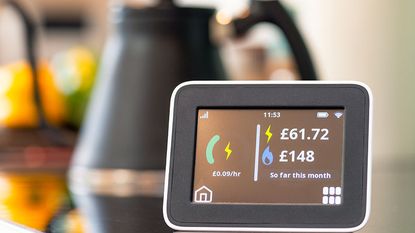What is the £400 energy grant and how will it be paid?
The government’s £400 energy grant is a discount applied to domestic energy bills in England, Scotland and Wales, with similar support for those in Northern Ireland. Here's how the grant will be paid.


The Energy Bills Support Scheme – the government’s £400 energy grant – is a rare sliver of good news amid a tumultuous time for UK consumers.
The energy grant is a £400 energy bill discount that will be made to households in England, Scotland and Wales. Households in Northern Ireland will get similar support.
The energy bill rebate, which was announced by former chancellor Rishi Sunak, is still in place under the new government and will be joined by prime minister Liz Truss’s Energy Price Guarantee, which aims to limit energy prices to around £2,500 for the average user.
Subscribe to MoneyWeek
Subscribe to MoneyWeek today and get your first six magazine issues absolutely FREE

Sign up to Money Morning
Don't miss the latest investment and personal finances news, market analysis, plus money-saving tips with our free twice-daily newsletter
Don't miss the latest investment and personal finances news, market analysis, plus money-saving tips with our free twice-daily newsletter
For a household with average energy use, the £400 grant coupled with the new cap will result in energy bills rising by 6.5%, significantly lower than the 80% rise that would have occurred without Truss’s energy price cap freeze.
Sunak‘s original proposal was for a £200 support scheme that would be clawed back through people’s energy bills. But that was ditched for the £400 energy grant that does not need to be paid back. Instead, it will be funded by a windfall tax on oil and gas companies.
How will I get the £400 energy grant?
The discount will be spread out over the next six months. Households will get the discount each month, irrespective of their income and whether they pay their bill on a monthly or quarterly basis.
You are not required to apply for the discount as it will be automatically applied to your energy account. You should not have to contact your energy supplier unless you have not received the first instalment by the end of October.
If you pay for your electricity by pre-paid meter, you should get the discount applied in the first week of every month. You will either get an automatic credit when you top up your card, or you will be sent vouchers by text message, email or through the post – so make sure your energy supplier has up-to-date contact details for you.
If you have a “smart” pre-paid meter, the discount will be automatically applied in the first week of every month.
If you live in non-standard accommodation – on a caravan park or in a houseboat, for example, or if you live “off-grid”, the government has said it will provide “equivalent support”.
If you pay for your electricity as part of your rent – and that covers almost 585,000 people, or 13% of renters, according to Citizens Advice – the landlord must not charge you more for your electricity than they pay for it. So they should pass on the discount to you.
Distribution of the £400 energy grant may vary from supplier to provider as the government has left it to them to decide how they want to distribute it. Here’s how each provider is planning to apply it.
How will my energy provider apply the discount?
British Gas
Most British Gas customers pay via direct debit, so they will receive the amount in the form of six direct payments, spread out over six months.
After you have paid your monthly direct debit, then it appears that you will receive a refund to your bank account.
If you pay by credit, then the discount will be applied to your bill in the first week of the month.
EDF
EDF will pay the £400 bill discount in a similar way to British Gas.
OVO
In the case of OVO, the discount will be applied directly shortly after the initial payment amount has been deducted.
And if your payment is taken on a pay-as-you-go (PAYG) basis, the discount will be credited in the first week of each month into your account.
Scottish Power
Scottish Power will also be paying the amount in the form of six payments, however those payments will vary a little. The first two payments will amount to £66, meanwhile starting from December, the payment amount will marginally rise to £67.
If you pay by monthly direct debit, you will receive the discount in the form of a refund once the initial direct debit payment has been made. Those paying on PAYG will automatically receive the discount in the first week of the month.
E.ON
For E.ON customers that pay via direct debit, the discount will be applied before the direct debit takes place.
PAYG customers will see credit added to the payment section of their bill each month.
Shell Energy
Shell Energy customers who pay via direct debit will receive six payments across six months, before the direct debit amount is deducted.
Shell Energy told The Money Edit, MoneyWeek’s sister publication, that customers who pay for energy via cash, card or cheque will see the discount in the form of an extra payment section that appears on the bill from October through to March. Bulb
For Bulb customers, the discount will be paid in monthly instalments worth £66 in both October and in November and the figure will increase to £67 from December to March.
Those who pay the same amount every month will see the amount deducted from their monthly payments. Meanwhile, credit worth that amount will be added to the accounts of those who are on variable direct debits.
Smart prepay customers will see the payment added in the form of credit to accounts.
Utility Warehouse
Utility Warehouse customers will receive the discount in the form of six automatic payments, starting from October. Customers will receive a discount of £66 from October to November and they will receive £67 from December to March.
Customers who have a smart prepayment meter will receive the payments remotely to the meter at the start of the month.
If you have a traditional prepayment you will receive a voucher which will be redeemable at any PayPoint counter once you show a photo ID. Although Utility Warehouse warns that customers may have to wait up to 11 working days until they receive their vouchers.
Octopus Energy
Octopus Energy’s Direct Debit customers will see their bill fall by £67 for six months starting from October.
Customers who do not pay via direct debit will receive monthly credit payments of £67.
Saloni is a web writer for MoneyWeek focusing on personal finance and global financial markets. Her work has appeared in FTAdviser (part of the Financial Times), Business Insider and City A.M, among other publications. She holds a masters in international journalism from City, University of London.
Follow her on Twitter at @sardana_saloni
-
-
 Investment trust discounts hit 2008 levels. Here’s how to profit
Investment trust discounts hit 2008 levels. Here’s how to profitInvestment trust discounts have risen to levels not seen since 2008, here are three trusts looking to buy to profit.
By Rupert Hargreaves Published
-
 A luxury stock to buy at a high street price
A luxury stock to buy at a high street priceInvestors wrongly consider Watches of Switzerland a high-street outlet.
By Dr Matthew Partridge Published
-
 Will energy prices fall in 2023?
Will energy prices fall in 2023?News The latest price cap kicked in at the start of July, seeing households pay around 17% less for energy. But will energy prices fall further this year? We look at what you can expect to pay and what will happen to energy prices in 2023
By Kalpana Fitzpatrick Last updated
-
 Rent prices continue to rise but demand slows as cost of living pressures bite
Rent prices continue to rise but demand slows as cost of living pressures biteNews The latest data from Zoopla shows rental growth is expected to slow to 5% as demand decreases
By Nicole García Mérida Published
-
 The best credit cards with 0% on purchases – March 2023
The best credit cards with 0% on purchases – March 2023Advice 0% credit cards are a great way to spread the cost of big purchases - we flag the best deals available now.
By Rupert Hargreaves Published
-
 Supermarket petrol prices are 6p higher per litre than they should be - how to save on fuel
Supermarket petrol prices are 6p higher per litre than they should be - how to save on fuelAdvice Many of us are looking at ways to save money on petrol and diesel, yet supermarkets have been found guilty of upping their profit margins the CMA has found. We look at how you can save on fuel costs and what the proposed Pumpwatch scheme means for you.
By John Fitzsimons Last updated
-
 Fan heater vs oil heater – which is cheaper?
Fan heater vs oil heater – which is cheaper?Advice Sales of portable heaters have soared, as households look to cut their energy costs. But which is better: a fan heater or an oil heater? We put them to the test to see which one comes out cheaper.
By Ruth Emery Published
-
 Wood-burning stove vs central heating ‒ which is cheapest?
Wood-burning stove vs central heating ‒ which is cheapest?Advice Demand for wood-burning stoves has surged as households try to reduce their heating costs this winter. But how does a wood burner compare with central heating? We put them to the test to find out which is cheapest.
By Ruth Emery Published
-
 Is it cheaper to leave the heating on low all day?
Is it cheaper to leave the heating on low all day?Advice The weather is getting colder and energy bills are rising, but is it really cheaper to leave the heating on low all day or should you only turn it on when you need it?
By Nicole García Mérida Published
-
 How much does it cost to run an electric oven?
How much does it cost to run an electric oven?Advice We explain how much making a jacket potato, casserole or pizza in the oven costs you.
By Katie Binns Published









